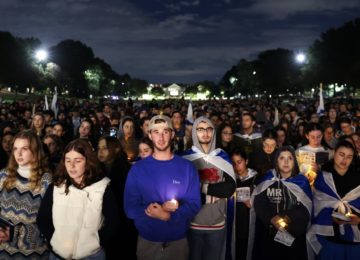Jeffrey Flier in The Chronicle of Higher Education:
 Disputes arising from geopolitical crises occur in numerous social settings, but colleges are especially vulnerable. First, campuses by their nature are (or should be) spaces for robust debate on contested topics, strongly protected by free-speech norms. Second, students and faculty represent diverse nationalities, religions, cultures, and belief systems. Third, college leaders are expected by many to express opinions on political and social issues on behalf of the institution.
Disputes arising from geopolitical crises occur in numerous social settings, but colleges are especially vulnerable. First, campuses by their nature are (or should be) spaces for robust debate on contested topics, strongly protected by free-speech norms. Second, students and faculty represent diverse nationalities, religions, cultures, and belief systems. Third, college leaders are expected by many to express opinions on political and social issues on behalf of the institution.
This last practice is complex, and increasingly contested. The central mission of colleges is to serve as communities for discovery, improvement, and the transmission of knowledge. By fulfilling these roles, they play a critical role in the evolution of the social and political values of the societies in which they exist. Faculty are the key producers of this work, coordinated by administrative leaders who organize and facilitate the many complex activities required to carry out the mission. The extent to which college leaders should, in addition to their administrative roles, express institutional positions on contestable social and political issues is a matter of legitimate dispute.
More here.
